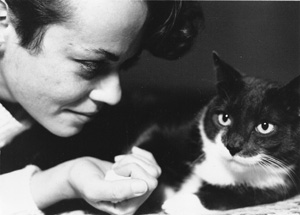When it became apparent by my mid-twenties that I could not live by myself or in communal housing or anywhere except the hospital, I moved in with my grandmother. I’d nearly died. I wished I had done. The ER had called my parents to break the news that I might not live until morning, and they wouldn’t drive fifty miles to see me. When I finally managed to return to consciousness, the doctor asked me why I’d tried to kill myself. I could only whisper, “Grief.”
I sat in my room in my grandmother’s black house in Winthrop, Massachusetts, and chain-smoked for two years without seeing or talking to anyone but her. But my grandmother—legally blind, arthritic, full of needs—slowly pulled me out of the paisley shape I made on the bed. I began to care for her because she needed me, and I needed to be called back to life, in whatever form it took. She was eighty, and I was twenty five…
In her new memoir, The Linen Way, Melissa Green recalls how poetry, and particularly her poetic friendships with Derek Walcott and Joseph Brodsky, rescued her from seclusion and madness and introduced her to her life-saving craft. An excerpt covering these two formative friendships appears in the current issue of Parnassus: Poetry in Review, and we celebrate with a new poem in Little Star Weekly.
Melissa Green is the author of two books of poems, The Squanicook Eclogues, which won the Norma Farber Award from the Poetry Society of America and the Lavan Award from the Academy of American Poets, and Fifty-Two; as well as a memoir, Color is the Suffering of Light. She is Contributing Editor to Little Star, and her work has appeared in our print volumes 1, 2, and 3. The title poem to The Squanicook Eclogues, whose composition Green describes in the Parnassus memoir, appeared in Little Star Weekly #3. Watch a tribute to Green with Derek Walcott, Rosanna Warren, David Ferry, Fanny Howe, Frank Bidart, Robert Pinsky, and more, here.
